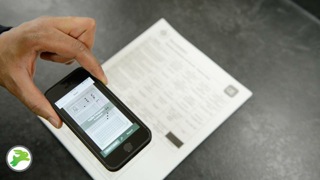 A Q&A with Quick Key co-founder Walter O. Duncan. The Cambridge, Massachusetts-based startup, which offers a mobile device based test grading app for teachers, announced at the end of May that it had raised $100,000 in Seed funding from ARC Capital Development and additional unnamed investors. It was founded in 2012 by Duncan and Isaac Van Wesep. The company’s initial funding came from a successful $20,000 raise on Kickstarter.
A Q&A with Quick Key co-founder Walter O. Duncan. The Cambridge, Massachusetts-based startup, which offers a mobile device based test grading app for teachers, announced at the end of May that it had raised $100,000 in Seed funding from ARC Capital Development and additional unnamed investors. It was founded in 2012 by Duncan and Isaac Van Wesep. The company’s initial funding came from a successful $20,000 raise on Kickstarter.
SUB: Please describe Quick Key and your primary innovation.
Duncan: Quick Key is a mobile and web app that turns a smart device into a mobile scanner that allows teachers to mark assessments and surveys in seconds, saving teachers ten hours a week and giving them real time data to drive instruction.
SUB: Who are your target markets and users?
Duncan: Quick Key is perfect for school districts, schools and individual teachers. Quick Key also has a lot of applications in other industries.
SUB: Who do you consider to be your competition, and what differentiates Quick Key from the competition?
Duncan: Quick Key is different from Scantron in that it allows the school districts, individual schools and teachers to access the power of data to drive instruction for a price that is very reasonable. It does this without expensive machines and costly answer sheets. We have patented mobile scanning technology and a mobile sync database that allows full functionality without the Internet, even though Quick Key works on both web and phone.
Quick Key is different from all-digital assessment tools that require students to have a tablet or phone, so it is accessible to the 95 percent of teachers and students around the world who don’t have access to all-digital classrooms.
 SUB: What was the inspiration behind the idea for Quick Key? Was there an ‘aha’ moment, or was the idea more gradual in developing?
SUB: What was the inspiration behind the idea for Quick Key? Was there an ‘aha’ moment, or was the idea more gradual in developing?
Duncan: Quick Key started with a conversation. I was talking to my good friend, and co-founder, Isaac D. Van Wesep about technology in the classroom, and I was ranting, and I said something like: “I just wish my iPhone could scan my daily exit tickets,” and Isaac, who is an entrepreneur, stopped me and said: “Really? And how would that change things for you as a teacher?” At the time, I was just starting my 15th year in the classroom.
A year later, Isaac and I have assembled a slightly bigger team—a former student of mine, who is now a junior at UC Berkeley and a software developer, built the web app for us, and a friend of his—also a student at Berkeley—has been helping out too. These guys are young and sharp, and I love it that one of my former students is on the team. It’s awesome.
SUB: What were the first steps you took in establishing the company?
Duncan: First we had to incorporate and seek funding from friends and family. Then we began the process of designing the app to meet the needs of teachers. A great deal of edtech is foisted upon teachers and they are required to learn a lot of newfangled things that take a lot of time; time teachers would rather be spending on creating and executing excellent lessons.
We had to make sure that Quick Key worked for teachers and didn’t make more work for them; and judging by the way that Quick Key has been received, we did a good job, but we are just getting started. The large community of educators that we work with allows us to continue to make improvements to the app that benefit teachers and students worldwide.
SUB: How did you come up with the name? What is the story or meaning behind it?
Duncan: It is fairly simple—Isaac and I were talking and I said I need a quick answer key for my exit tickets. Exit tickets are short assessments used at the end of the class to gather data from students about how much of the lesson they mastered. Isaac said: “What about a quick key.” And the name was born.
SUB: What have the most significant challenges been so far to building the company?
Duncan: For a small startup, raising money is always a challenge. Additionally, as a career teacher, learning how to be an entrepreneur has been quite a task. But with the help of my co-founder and our advisors, I am growing each day.
SUB: How do you generate revenue or plan to generate revenue?
Duncan: Quick Key will launch its paid service in the fall to teachers, schools and districts. Additionally we are licensing our technology to other industries. We are excited about our potential for generating revenue.
SUB: What are your goals for Quick Key over the next year or so?
Duncan: In the coming year we will continue to rapidly grow our user base. Quick Key will also be available on the Google Play store for Android devices. Additionally, we will release a new set of upgraded features for the fall, including an admin dashboard and shared accounts. A basic version of Quick Key will remain free for teachers who may be in districts that lack resources.













